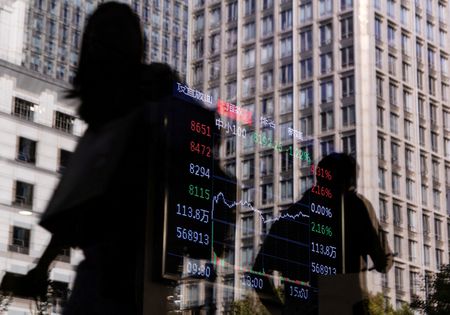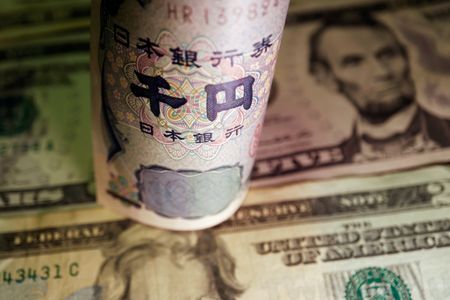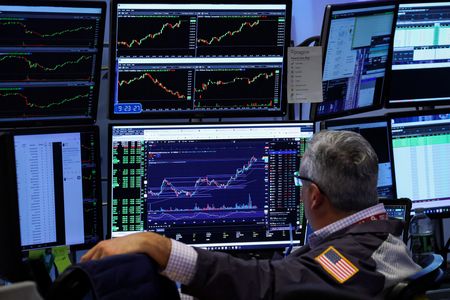By Dhara Ranasinghe
LONDON (Reuters) -World stocks rallied on Wednesday with European markets hitting record highs as the U.S. Congress looked set to end a federal shutdown, paving the way for a data fog that has fuelled U.S. economic uncertainty to clear.
The yen was also in the spotlight as its fall to nine-month lows against the dollar prompted more comments from officials.
Europe’s STOXX-600 index and London’s FTSE 100 share index hit record highs, led by banks, while U.S. stock futures pointed to a positive open on Wall Street and Japan’s blue-chip Nikkei closed 0.4% higher.
U.S. JOBS DATA EXPECTED
The Republican-controlled House of Representatives is due to vote later on Wednesday on a compromise that would restore funding to government agencies and end a shutdown that started on October 1. The Republican-controlled Senate approved the deal on Monday.
“There was always a risk that if the shutdown continued, growth would be impacted and so data would be hard to read,” said State Street’s head of macro strategy, Michael Metcalfe.
“So, the fact that we’ve finally got through the shutdown means there is a relief that there isn’t going to be a significant shutdown-driven slowdown in growth.”
U.S. jobs numbers are perhaps the most keenly anticipated data that has not been released due to the shutdown, as investors weigh up whether the U.S. Federal Reserve will cut rates again in December.
Tuesday’s weekly jobs data from ADP showed private employers shed an average of 11,250 jobs a week in the four weeks ending on October 25.
Markets price in a roughly 64% probability of a 25-basis-point Fed cut in December.
“For the equity rally to extend, the data needs to be soft enough to encourage the Fed to cut and not too soft to raise slowdown fears,” said Metcalfe.
In Japan on Wednesday, the broader Topix index rose over 1% to hit a new record high. SoftBank Group bucked the trend with a 3.5% decline, taking its month-to-date loss to around 19% after it said it had sold its entire stake in Nvidia on Tuesday.
Even after the recent fall, shares in Japan’s biggest tech sector investor have more than doubled this year.
Upbeat quarterly earnings from Dutch bank ABN AMRO helped boost the pan-European STOXX 600 index 0.6%, while the FTSE index was a touch lower after hitting record highs.
YEN WATCH
The yen fell to nine-month lows at around 154.91 per dollar. Its weakness prompted fresh signs of angst from Tokyo with Finance Minister Satsuki Katayama saying she would not deny that the negative aspects of the weak yen on the economy have become more pronounced than the positive ones.
It has fallen 0.9% for the week thus far, bruised by the overall risk-on market sentiment based on optimism about the U.S. shutdown ending, and as investors expect greater fiscal largesse under new Prime Minister Sanae Takaichi.
“The effect of verbal intervention is not as significant as it once was,” said Mohamad Al-Saraf, FX strategist at Danske Bank. “For Japanese authorities to really strengthen the yen, they need to do real intervention, which could be a possibility over the next couple of months.”
The dollar index, which measures the greenback against other major currencies, was last 0.1% higher at 99.59, while the euro was little changed around $1.1572.
Sterling was a touch softer around $1.3123 while there was a slight underperformance in UK government bonds as politics came back into focus.
Britain’s 30-year gilt yield was last up 5 basis points on the day at 5.22%, while U.S. Treasury yields were lower.
British health minister Wes Streeting denied on Wednesday he was plotting to bring down Keir Starmer, after unnamed allies of the prime minister briefed newspapers that they feared an attempted coup could come after the November 26 budget.
Brent crude futures <LCOc1> slipped 55 cents, or 0.8%, to around $64.61 a barrel after gaining 1.7% on Tuesday. U.S. West Texas Intermediate crude <CLc1> fell 0.9%, to $60.48 a barrel.
Gold was little changed on the day at around $4,126. [GOL/]
(Reporting by Dhara Ranasinghe in London; additional reporting by Gregor Stuart Hunter in Singapore and Samuel Indyk in London; Editing by Kim Coghill, Jane Merriman and Aidan Lewis)










